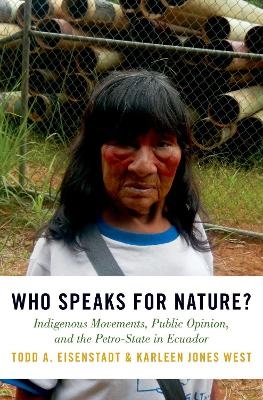
Who Speaks for Nature?
Oxford University Press Inc (Verlag)
978-0-19-090895-9 (ISBN)
This book, based on a nationwide survey and interviews about environmental attitudes among citizens as well as indigenous, environmental, government, academic, and civil society leaders in Ecuador, offers a theory about when and why individuals will speak for nature, particularly when economic interests are at stake. Parting from conventional social science arguments that political attitudes are determined by ethnicity or social class, the authors argue that environmental dispositions in developing countries are shaped by personal experiences of vulnerability to environmental degradation. Abstract appeals to identity politics, on the other hand, are less effective. Ultimately, this book argues that indigenous groups should be the stewards of nature, but that they must do so by appealing to the concrete, everyday vulnerabilities they face, rather than by turning to the more abstract appeals of ethnic-based movements.
Todd Eisenstadt is Professor of Government at American University. He has worked on six continents, publishing multiple award-winning books and dozens of articles. He studies development with research that focuses on democratization and environmental politics, as well as the relationship between constitution-making processes and democratization. Karleen West is Assistant Professor of Political Science and International Relations at SUNY Geneseo. She researches how historically marginalized groups gain representation in Latin America and around the world. Her work has been published in the Latin American Research Review, Comparative Political Studies, Legislative Studies Quarterly, Comparative Politics, and Party Politics, among others.
Acknowledgements
Chapter 1: Beyond Multiculturalism: Vulnerability Politics and the Environment in Latin America
Chapter 2: Multiculturalism Versus Polycentric Pluralism: Vulnerability Challenges Post-Materialist Values on Ecuador's Oil Extraction Frontier
Chapter 3: Does Prior Consultation Diminish Extractive Conflict or Channel It to New Venues? Evidence from Ecuador and the Andes
Chapter 4: Crude Bargaining: Indigenous Ambivalence Regarding Oil Extraction in the Ecuadorian Amazon
Chapter 5: How Science, Religion, and Politics Influence Indigenous Attitudes on Climate Change in Ecuador
Chapter 6: Exploring the Contradiction of Extractive Populism between Domestic and International Politics in Ecuador
Chapter 7: How to Effectively Speak for Nature?
Bibliography
Index
| Erscheinungsdatum | 22.06.2019 |
|---|---|
| Reihe/Serie | Studies Comparative Energy and Environ |
| Verlagsort | New York |
| Sprache | englisch |
| Maße | 236 x 165 mm |
| Gewicht | 522 g |
| Themenwelt | Sozialwissenschaften ► Ethnologie |
| Sozialwissenschaften ► Politik / Verwaltung ► Vergleichende Politikwissenschaften | |
| Sozialwissenschaften ► Soziologie | |
| ISBN-10 | 0-19-090895-5 / 0190908955 |
| ISBN-13 | 978-0-19-090895-9 / 9780190908959 |
| Zustand | Neuware |
| Haben Sie eine Frage zum Produkt? |
aus dem Bereich


